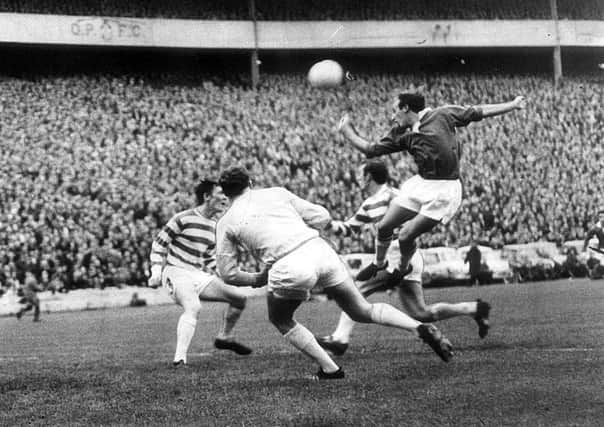Saints who played way into Perth hall of fame


Every October to this day, a group of men – a little balder, a bit greyer, a few betraying evidence of a limp – gather in Perth to commemorate the achievement.
They go to a game, swap jokes, trade banter and toast absent friends. From the side that lined up against Celtic that afternoon at Hampden Park, Alex Gordon and Ian McPhee have both since sadly passed away. Henry Hall admits he still gets teased about the first-minute miss that was to grow in significance shortly afterwards, when Bertie Auld scored what proved to be the game’s winning goal, after only two minutes.
Advertisement
Hide AdAdvertisement
Hide Ad“When we meet annually, I always get a ribbing,” he recalls. “I had a chance in the first minute. It came too quick and I could not get it on target. It was a half-chance. I did not quite get a hold of it. [Goalkeeper] Ian Donaldson keeps reminding me each time I see him: ‘if you had scored with that, we would have won!’
“We have a weekend, stay overnight in Perth,” adds Hall, now 68 and based in Monifieth. “We watch a match, have a blether and reminisce. There were 11 there last time from the squad. It was a good turn-out.”
It is nice to think this could be a tradition kept on by the current St Johnstone in years to come should they progress past Aberdeen this afternoon and book themselves a place in this year’s League Cup final; that in years to come they, too, will meet and discuss the achievement. Rather than lament the chance that got away, they might celebrate the goal that lifted the first major trophy in the club’s history, something Hall and his cohorts could not quite manage under Willie Ormond.
“We had a really outstanding team then but we came up against a Celtic team who were virtually still European champions, and yet we competed with them quite often,” says Hall. “To be honest, the St Johnstone team of the last couple of seasons have competed with everyone, and have beaten Celtic and Rangers in the past. It is possibly not as difficult as it once was. But when you get to a cup semi-final or a final a lot of it comes down to lack of experience, if you fall short.”
“There’s no Celtic in the final this time and no Rangers either so that is a big incentive,” Hall adds. “We former players don’t like saying it, but having seen enough of the standard of the present game, I have to say the team then was better – not just St Johnstone, but the majority of the teams. But that’s life. The players are not being produced. That’s the way it goes.”
The surviving members of the Ormond-era side deserve the freedom of Perth for what they brought to the city. A glance at the statistics provides ample evidence to support Hall’s contention that “we were on fire then”. Partick Thistle were beaten 8-1 and 4-0 in League Cup group games, and then, a few weeks later, another five goals were put past the same side in the league. Falkirk were beaten 11-3 on aggregate in the League Cup quarter-finals. The 2-0 semi-final victory over Motherwell seems fairly humdrum by comparison. “Like Dundee United when they are on song now, we were like that too.”
Hall does not see St Johnstone as much as he might like to these days, so each October he is happy to have the excuse to head to McDiarmid Park and meet old friends, as well as see who is coming through the ranks. He once had professional reasons to be interested. As St Johnstone youth coach in the early 2000s, he was there when Keigan Parker started to makes waves. Now the emerging star is Stevie May, who scored the opening goal in the 4-0 win over Inverness Caledonian Thistle in front of the class of ’69 at McDiarmid Park late last year. There are firm hopes that May, who earlier this season scored the club’s first top-tier hat-trick since Hall struck three against Dundee in 1973, can scale the heights.
“I thought he made all the right runs, he has the attributes,” says Hall. “He has the pace. I have seen him twice, and he does make good runs. You just have to give him time now. The loan deals seem to have helped make him into the player he is because he has been getting games.
Advertisement
Hide AdAdvertisement
Hide Ad“It is just about how he handles the limelight. There is the danger of too much publicity. I think that is what got to the Dundee United players. It was in the papers every night and every week, all about these two guys being world beaters.
“I think Saints should try and keep him [May] out of the limelight and let him develop. But you cannot do much about that if the scouts are all there. You don’t get the chance to learn your craft now. If a big offer comes in you can’t refuse. He might make ten times elsewhere, there is no decision to make.”
Hall was offered an attractive opportunity of his own early in his career, while still at first club Stirling Albion (he had signed provisionally for Dundee under Bob Shankly, but his successor Bobby Ancell did not pursue the deal). Bruges, then an emerging force in European football, wanted to sign him. “It was unusual at the time,” he says, of a Scot being offered the chance to play abroad. “I have no idea how it came about. I just said no, I had PE college to go to. And I managed to play in Europe anyway – for St Johnstone.”